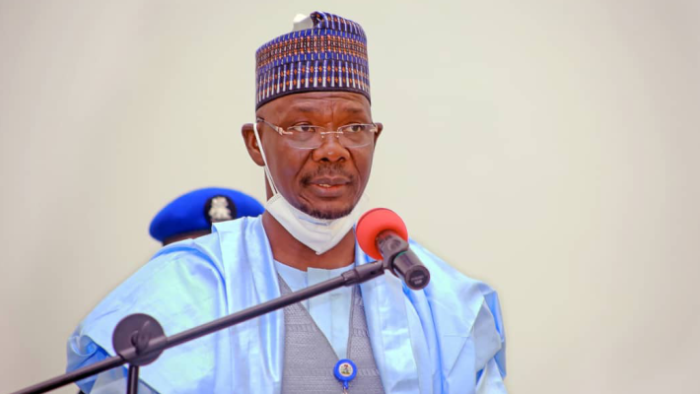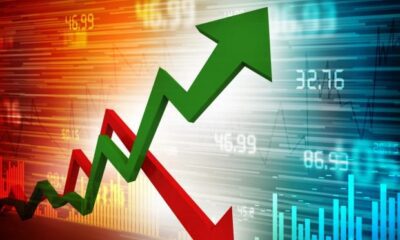Money market
Again, Nigeria’s inflation rises in twelfth consecutive month
…As headline inflation hits 28.92%
…Stears predicts 31.85% annual inflation, recommends dollar illiquidity to tackle inflation
By Sodiq Adelakun, Lagos and Mathew Denis, Abuja
Inflation in Nigeria continued to rise for the twelfth consecutive month in December, 2023 with the headline inflation rate reaching 28.92 percent, up from 28.20 percent in November.
The National Bureau of Statistics released its consumer price index report on Monday, revealing the ongoing impact of inflation on the country’s economy.
The figure represents a 0.72 percent increase from the 28.20 percent recorded in November 2023. On a year-on-year basis, the headline inflation rate in December was 7.58 percent higher than the rate recorded in November 2022 at 21.34 percent.
The report attributed the increase in the headline index for December 2023 to the rise in some items in the basket of goods and services at the divisional level.
It said these increases were observed in food and non-alcoholic beverages, housing, water, electricity, gas, and other fuel, clothing and footwear, and transport.
Others were furnishings, household equipment and maintenance, education, health, miscellaneous goods and services, restaurants and hotels, alcoholic beverage, tobacco and kola, recreation and culture, and communication.
In addition, the report said, on a month-on-month basis, the headline inflation rate in December 2023 was 2.29 percent, which was 0.20 percent higher than the rate recorded in November 2023 at 2.09 percent.
“This means that in December 2023, the rate of increase in the average price level is more than the rate of increase in the average price level in November 2023.”
It said the percentage change in the average CPI for the 12 months ending December 2023 over the average of the CPI for the previous corresponding 12-month period was 24.66 percent.
“This indicates a 5.81 percent increase compared to 18.85 percent recorded in December 2022.”
The report said the food inflation rate in December increased to 33.93 percent on a year-on-year basis, which was 10.18 percent higher compared to the rate recorded in December 2022 at 23.75 percent.
“The rise in food inflation on a year-on-year basis is caused by increases in prices of bread and cereals, oil and fat, potatoes, yam and other tubers, fish, meat, fruit, milk, cheese, and egg.”
It said on a month-on-month basis, the food inflation rate in December was 2.72 percent, which was a 0.30 percent increase compared to the rate recorded in November 2023 at 2.42 percent.
“The rise in food inflation on a month-on-month basis was caused by an increase in the average prices of oil and fat, meat, bread and cereals, potatoes, yam and other tubers, fish and milk, cheese, and egg.”
The report said that “All items less farm produce and energy” or core inflation, which excludes the prices of volatile agricultural produce and energy, stood at 23.06 per cent in December on a year-on-year basis.
“This increased by 4.85 percent compared to 18.21 percent recorded in December 2022.
“The exclusion of the PMS is due to the deregulation of the commodity by removal of subsidy.”
It said the highest increases were recorded in prices of passenger transport by road, medical services, actual and imputed rentals for housing, passenger transport by air, pharmaceutical products, accommodation service, etc.
The NBS said on a month-on-month basis, the core inflation rate was 1.82 percent in December 2023.
“This indicates a 0.29 percent rise compared to what was recorded in November 2023 at 1.53 percent.
“The average 12-month annual inflation rate was 20.76 percent for the 12 months ending December 2023, this was 4.74 percent points higher than the 16.02 percent recorded in December 2022.”
The report said on a year-on-year basis in December, the urban inflation rate was 31.00 per cent, which was 8.98 per cent higher compared to the 22.01 per cent recorded in December 2022.
“On a month-on-month basis, the urban inflation rate was 2.42 percent in December representing a 0.19 percent increase compared to November 2023 at 2.23 percent.”
The report said on a year-on-year basis in December, the rural inflation rate was 27.10 percent, which was 6.38 percent higher compared to the 20.72 percent recorded in December 2022.
“On a month-on-month basis, the rural inflation rate was 2.17 percent, which increased by 0.18 percent compared to November 2023 at 1.99 percent.”
On states’ profile analysis, the report showed in December, all items inflation rate on a year-on-year basis was highest in Kogi at 35.58 percent, followed by Lagos at 32.33 percent, and Rivers at 32.16 percent.
It, however, said the slowest rise in headline inflation on a year-on-year basis was recorded in Borno at 23.27 percent, followed by Taraba at 24.92 percent, and Katsina at 26.52 percent.
The report, however, said in December 2023, all items inflation rate on a month-on-month basis was highest in Bayelsa at 3.66 percent, followed by Bauchi at 3.51 percent, and Oyo at 3.45 percent.
“Nasarawa at 1.36 percent, followed by Delta at 1.49 percent and Sokoto at 1.58 percent recorded the slowest rise in month-on-month inflation.”
The report said on a year-on-year basis, food inflation was highest in Kogi at 44.73 percent, followed by Kwara at 41.33 percent, and Imo at 39.54 percent.
“Bauchi at 27.49 percent, followed by Jigawa at 27.98 percent and Sokoto at 28.72 percent recorded the slowest rise in food inflation on a year-on-year basis.”
The report, however, said on a month-on-month basis, food inflation was highest in Bayelsa at 4.42 percent, followed by Ogun at 4.11 percent, and Enugu at 4.03 percent.
“While Nasarawa at 1.48 percent, followed by Delta at 1.65 percent and Niger at 1.67 per cent, recorded the slowest rise in inflation on a month-on-month basis.”
Meanwhile Stears, a leading economic analysis and data-driven insights provider in its 2024 African Outlook Report has predicted a 31.85% annual inflation for Nigeria.
In its macroeconomic Outlook for Nigeria, Stears projected an average annual inflation rate between 27.59 percent to 31.85 percent for 2024, considering the current economic climate and the depreciating naira.
“We anticipate the CBN will maintain orthodoxy and continue its tightening policy in the near term to address inflationary pressures,” the report noted.
The research body also recommended that an immediate action on dollar illiquidity is crucial for effective inflation management.
“In the longer term, enhancing productivity, a task for fiscal authorities, will be key,” the report stated.
In 2024, Africa’s overall growth is forecasted at 4.0 percent, a notable increase from 3.3 percent in 2023, positioning it as the second-highest globally, trailing only Asia (4.8 percent). East Africa takes centre stage in this growth narrative, exhibiting consistently higher growth rates than the rest of the continent. Rwanda, Tanzania, Uganda, and Kenya are identified as key drivers, collectively contributing significantly to the region’s economic resurgence.
Dumebi Oluwole, Senior Economist at Stears, underscores the significance of inflation as a barometer of economic health and advocates for the urgent need to address the persistent challenge of currency depreciation. The report reveals a closer alignment of the Kenyan Shilling (KES) to its fair value, shedding light on the delicate balance between inflation dynamics and investor attractiveness.
He explains, “The elimination of petrol subsidies has significantly heightened the cost of living for consumers, leading to an overall uptick in inflation. Coupled with the devaluation of the naira, this has precipitated higher exchange rates, complicating the economic landscape for both consumers and businesses.”
Stears emphasises the need for strategic interventions to enhance liquidity and stabilise the exchange rate, highlighting the importance of collaborative initiatives between the government, regulatory bodies, and the private sector for sustained economic growth.
Money market
Nigeria’s inflation rate rises to 33.69% in April 2024


In April 2024, the headline inflation rate rose to 33.69 percent, up from 33.20 percent in March 2024, marking an increase of 0.49 percent points according to the Nigeria Bureau of Statistics (NBS).
Comparing year-on-year data, the inflation rate in April 2024 was 11.47 percent points higher than in April 2023, where it stood at 22.22 percent. This indicates that the headline inflation rate has risen significantly over the past year.
Additionally, on a month-to-month basis, the inflation rate for April 2024 was 2.29 percent, which is 0.73 percent lower than the 3.02 percent recorded in March 2024. This suggests that the rate at which prices increased in April 2024 was slower than the rate in March 2024.
In April 2024, the food inflation rate reached 40.53 percent on a year-on-year basis, marking a substantial increase of 15.92 percentage points from the 24.61 percent recorded in April 2023. This significant rise in food inflation can be attributed to higher prices for several items including millet flour, garri, bread, prepacked wheat flour, and semovita, all of which belong to the Bread and Cereals class, as well as for yam tuber, water yam, and cocoyam and others.
For the year ending in April 2024, the average annual rate of food inflation stood at 32.74 percent, representing an increase of 9.52 percentage points over the 23.22 percent average annual rate recorded in April 2023.
Core inflation, which excludes the prices of volatile agricultural products and energy, reached 26.84 percent in April 2024 on a year-on-year basis, an increase of 6.87 percent from the 19.96 percent recorded in April 2023. The most significant price rises were observed in actual and imputed rentals for housing, motorcycle journeys, bus journeys within a city (under Passenger Transport by Road Class), consultation fees for medical doctors, X-ray photography (under Medical Services Class), and accommodation services.
On a month-on-month basis, the core inflation rate was 2.20 percent in April 2024, down from 2.54 percent in March 2024, representing a decrease of 0.34 percent. The average annual core inflation rate for the twelve months ending in April 2024 was 22.84 percent, which is 5.15 percentage points higher than the 17.70 percent recorded in April 2023.
In April 2024, the urban inflation rate on a year-on-year basis reached 36.00 percent, which is 12.61 percentage points higher than the 23.39 percent recorded in April 2023. On a month-on-month basis, the urban inflation rate for April 2024 was 2.67 percent, showing a decrease of 0.50 percentage points from the 3.17 percent seen in March 2024. The average urban inflation rate over the twelve months ending in April 2024 was 30.02 percent, marking an increase of 8.53 percentage points from the 21.50 percent reported in April 2023.
In April 2024, the rural inflation rate was 31.64 percent on a year-on-year basis, which is 10.50 percentage points higher than the 21.14 percent seen in April 2023.
On a month-on-month basis, the rural inflation rate for April 2024 was 1.92 percent, a decrease of 0.95 percentage points from the 2.87 percent recorded in March 2024. The average rural inflation rate over the twelve months ending in April 2024 was 26.38 percent, which represents an increase of 6.20 percentage points from the 20.18 percent reported in April 2023.
Money market
Governor Sule woos investors to invest in Nasarawa, assures of inclusive economy


…Counts gains of previous edition of investment summit
By Matthew Denis, Lafia
The Governor of Nasarawa state, Engr. Abdullahi Sule has taken steps to woo investors to invest in the state at the ongoing Nasarawa Investment Summit.
Delivering his opening speech, Governor Sule disclosed that the state is expanding the existing industrial, agricultural and mining sectors towards a better economy.
He said, “What we are witnessing today will further expand our existing pathways to leverage on the industrial, agricultural and mining sectors towards enhancing inclusive and sustainable wealth creation and economic prosperity.
“It is with a sense of fulfillment and responsibility that I address you today on the occasion of the Nasarawa Investment Summit, 2024.
“I must acknowledge our most cherished investors and other development partners, who are here to be part of this auspicious occasion. I have no doubt that the coming together of these distinguished and eminent personalities will, no doubt offer us the opportunities to continue to map the future of our State economic landscape in our relentless commitment to explore business opportunities and forge investment partnerships across business endeavour.”
The Governor stressed that it is pertinent to remind you that Nasarawa State organised the first edition of the Nasarawa Investment Summit in 2022 under the theme “Diamond in the Rough: The Making of a New Investment Frontier,” aimed at ushering investment and showcasing our mineral resources to potential investors.
“I am happy to state that the outcome of the Summit informed the influx of investors into the State Who are variously harnessing our God-given endowment.
“Interestingly, the recently commissioned Avatar New Energy Materials Company Limited in Nasarawa State performed by Mr. President, the ASGARD Mining and Processing Plant, Karu, the Nasarawa Technology Village Project in Karu, as well as other numerous investments being carried out in the State were all informed by the outcome of the Summit conducted in 2022.
“It is also heartwarming to state that the Federal Government commissioned the spud-in of the Ebenyi-A Oil Well in Obi Local Government Area of the State. The discovery of Oil and Gas and its subsequent exploration and exploitation will further boost the economic prosperity of our dear country and put Nasarawa State among the comity of Oil producing States.
“I, therefore, call on the investors on Oil and Gas to take advantage of the exploration activities to begin to invest in the sector for the benefit of the society.”
“To ensure full utilisation of our potentials, we have pledged to sustain the Investment Summit in order to further showcase other solid mineral resources which are yet to be identified by interested investors. This is why the theme of this year’s Summit is deliberately coined as ‘The Industrial Renaissance,’ having built some of the key fundamentals required to drive our industrial agenda and present other minerals to our potential investors.”
He explained that the staging of the 2024 Nasarawa Investment Summit,which we are witnessing today will further expand our existing pathways to leverage on the industrial, agricultural and mining sectors towards enhancing inclusive and sustainable wealth creation and economic prosperity.
“It is pertinent to point out that, as a State, we have been deliberate in stimulating our economy, building human capacities, creating wealth and generate employment to our people. It is for this reason that we have adopted our policy document christened ‘Nasarawa Economic Development Strategy (NEDS)’ as a driving force towards the initiation and implementation of various programmes and policies which we have achieved so far.
“I must acknowledge that with the assemblage of the experienced and versatile resource persons to engage the participants on the topics earmarked for discussion, I believe that the outcome of this Summit will go a long way towards actualizing our dream of industrialising Nasarawa State and position it as a leading champion.”
While applauding President Bola Ahmed Tinubu for his sustained effort in driving the Nigeria economy to prosperity, he said, “I assure Mr. President of our unalloyed loyalty and continued support in order to take our country to greater heights.”
“Let me as always, call on our development partners to continue to invest in Nasarawa State with the view to open the frontiers of economic prosperity for the benefit of all. Indeed, Nasarawa means business.”
Money market
CBN launches strategy to double remittances, grants AIP to 14 new IMTOs


The Central Bank of Nigeria (CBN) has activated plans to double foreign-currency remittance flows through formal channels by granting 14 new International Money Transfer Operators (IMTOs) Approval-in-Principle (AIP).
-
Finance4 months ago
Court orders Sen. Victor Umeh to repay N136m bank debt to AMCON
-



 Abuja Update3 months ago
Abuja Update3 months agoUNDP, FG partnership needed to achieve inclusion, equity- Minister
-
capital market2 years ago
Rt.briscoe, FBNH, Others halts negative performance of stock market
-
Abuja Update2 months ago
Banks drive stock market performance with N147bn gain
-



 Health1 month ago
Health1 month agoCapacity training will reduce migration of health workers- NPHCDA
-



 Business3 weeks ago
Business3 weeks agoTingo Group unveils Tingo Electric, Tingo Cola drink at Lagos launch
-
Submission Guidelines4 months ago
CALL FOR SUBMISSIONS: POETRY COLUMN-NND
-
News4 months ago
Oil thieves sponsoring malicious media campaign against Navy – Spokesman














